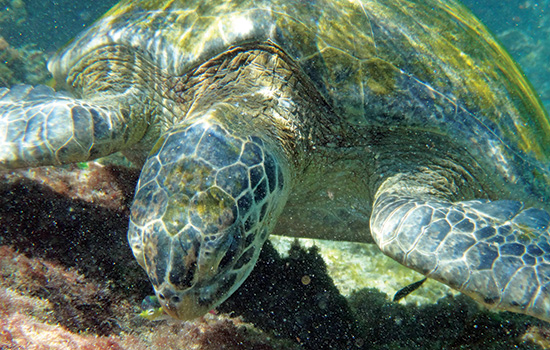Galapagos are paradise for reptiles–and RIT professor
Robert H. Rothman
Students on the Galapagos tour learn about the geology, land and sea birds and reptiles.
A freak accident in the Galapagos Islands cost Bob Rothman his wedding ring.
A strong current dragged the RIT professor over rocks while snorkeling. When he grabbed onto a rock, the ring he had worn for 46 years slipped off his finger and fell into a crack.
“I saw it happen and I couldn’t get it,” Rothman said. “So I told everybody that now I’m married to the Galapagos.”
The irony is not lost on anyone who knows Rothman, the professor in RIT’s Thomas H. Gosnell School of Life Sciences with a reputation for a demanding genetic engineering class, and a real passion for the Galapagos Islands.
Rothman is an expert on the wildlife and geology of the Pacific Archipelago located off the coast of Ecuador that inspired Charles Darwin’s theory of evolution by natural selection. Observations from Darwin’s 1835 voyage to the Galapagos Islands led him to link adaptation and evolutionary change to genetic variations that cause species to reproduce and spread favorable genes.
This January will mark Rothman’s 25th visit to the Galapagos and his 20th tour for RIT students, faculty and staff. His fascination for the place began in 1989 while on a trip offered through the Rochester Museum and Science Center.
Rothman signed up for the tour as professional development at the suggestion of his then-department head, G. Thomas Frederick, now professor emeritus. John Paliouras was dean of the College of Science at the time and provided funding for the trip. Rothman, who has a Ph.D. in genetics from the University of California at Berkeley, had joined RIT in 1984 when the College of Science was building its biotechnology program. He never guessed the profound impact the Galapagos trip would have on his career.
“I came to Darwin relatively late in life,” Rothman said. “I don’t do hero worship. Darwin is a metaphor for all the things I’m interested in—natural history, the intersection of religion and science, ethics. Darwin was a very ethical person. How can you describe everything you’re interested in in one word? For me, it’s Darwin. It covers all the big, integrative questions.”
Rothman has taken nearly 400 people to the Galapagos. His initiative has given hundreds of RIT students the opportunity to visit the archipelago and experience a different culture long before RIT’s current emphasis on study-abroad education.
Most of the students who go on the trip enroll in Rothman’s class, Galapagos: Evolution and Ecology, where they learn about the geology, the land and sea birds, the reptiles and the human impact.
“Then we go see everything that we have been discussing all semester,” Rothman said.
Students from his class take an “open-island exam” on their eight days in the archipelago.
Matthew Woodruff ’08 (biotechnology) went on the Galapagos trip during his junior year. Memories have stuck with him of “hiking around volcanoes, walking the cliffs where blue-footed boobies nest and swimming with sea lions and turtles.”
“The experience was surreal,” said Woodruff, a postdoctoral fellow at Emory University studying vaccine design. “I remember it vividly after almost eight years, but it was a very small piece of the impact Bob has had on my life.”
After the trip, Rothman took him on as an undergraduate researcher on a project that led Woodruff to pursue a Ph.D. in immunology at Harvard University.
“His support helped me identify where I wanted to go and eventually got me there,” Woodruff said. “I think it’s unlikely that I would have wound up where I am had we not crossed paths.”
Rothman plans to take RIT students to the Galapagos every January for the foreseeable future.
“There is no end to what you can see there,” he said. “I have a perspective on it that very few people have because when you go someplace one time you think that is the way it is, but I’ve been able to see a lot of the big cycles in the Galapagos,” Rothman said. “Each time you see it in a different light.”
Rothman has spent 25 years photographing the wildlife on the islands for a book he is writing about Galapagos reptiles—tortoises, marine and land iguanas, lava lizards, geckos and snakes. The working title of his manuscript is A Paradise for Reptiles, a reference to a quote from Darwin’s diary.
A portion of the proceeds from his book will go to the Galapagos Conservancy.
“I want to give back something because the Galapagos has been such a big part of my life,” he said. “It totally reoriented my scholarly and intellectual life since I started going. I want to give back, even in a little way.”















